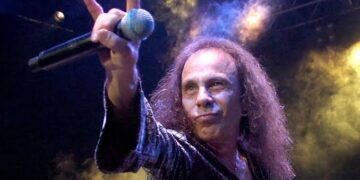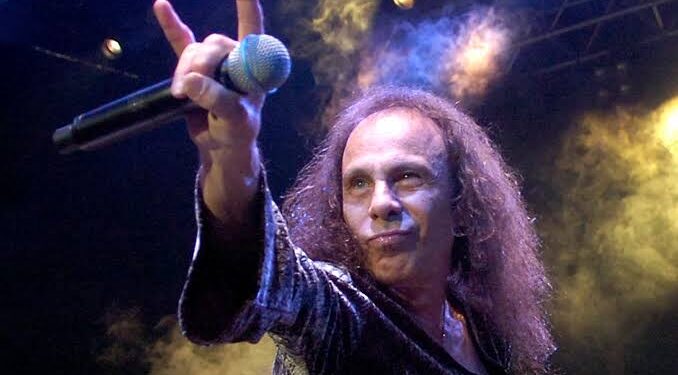Few voices in heavy metal have ever matched the power, passion, and mythical aura of Ronnie James Dio. A figure draped in mystery, dragons, and demons, Dio wasn’t just a frontman—he was a storyteller, a symbol of metal’s fantastical soul. But there was one rare interview where the enigmatic rock god pulled back the curtain, revealing more than fans—and perhaps even he—ever expected.

It was during a 2004 interview with a British rock magazine—promoting a tour and his album Master of the Moon—that Dio, then in his early 60s, let his guard down. What started as a routine chat about music quickly turned into a soul-baring session that caught even the interviewer off guard.
In a moment of unexpected candor, Dio touched on everything from his frustrations with the music industry, his deeply personal regrets, and even conflicted feelings about his time in Black Sabbath.
“I never really wanted to leave Rainbow the way I did,” he admitted. “But I felt like I had no choice. Ritchie [Blackmore] was becoming… difficult. Creative control was always going to be his, and I was just done being a puppet.”
That sentence alone sparked headlines across the metal world. It was rare to hear Dio speak in such unfiltered terms about his former bandmates. But he didn’t stop there.
On Sabbath, Ozzy, and the Burden of Legacy
The most jaw-dropping moment came when Dio offered an uncharacteristically blunt take on the never-ending comparisons between himself and Ozzy Osbourne.
“I was never trying to replace Ozzy,” he said. “But sometimes I felt like the fans didn’t want to see me succeed. I gave them Heaven and Hell and Mob Rules—some of the best records Sabbath ever made—and yet I was always ‘the other guy.’ That hurt more than I ever let on.”
Dio had always been gracious publicly about Ozzy and his time in Sabbath. But in this interview, it became clear that the shadow cast by Osbourne had followed him longer than he cared to admit.
Perhaps the most personal revelation was about his relationship with spirituality and the symbol he helped popularize: the devil horns.
“My grandmother used it to ward off evil. It meant protection, not worship. But over the years, people misunderstood it. Sometimes I wonder if I fed into that too much. I never meant to glorify the dark side. I’ve always believed in good.”
It was a striking admission from a man whose lyrics painted vivid scenes of demons, wizards, and infernal realms. For a moment, the curtain dropped and fans saw the deeply thoughtful, sometimes conflicted soul beneath the leather and thunder.
A Human Behind the Legend
By the time the interview ended, Dio had covered topics no one expected: his childhood in upstate New York, his lifelong battle with imposter syndrome, and a heartfelt admission that fame often left him lonely.
“I was the voice of a thousand battles,” he said, “but sometimes I just wanted someone to ask if I was okay.”
The Fallout
The interview caused a stir. Fans were divided—some applauded his honesty, while others felt it clashed with the mystique they’d come to love. Dio himself later admitted he may have said too much.
“I probably should’ve kept some of that inside,” he joked during a later press conference. “But hell, it’s the truth.”
And that’s what made the interview so legendary. For once, Ronnie James Dio—the metal icon, the lyrical sorcerer, the man behind the horns—stepped down from the mountain and spoke not as a god, but as a man.
And in doing so, he reminded us that even the mightiest voices sometimes carry the heaviest truths.
























